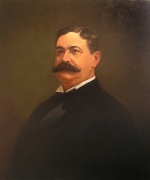 Charles Parlange was the scion of one of the oldest French families of Louisiana. He was a United States District Judge in the Eastern District of Louisiana for 13 years.
Charles Parlange was the scion of one of the oldest French families of Louisiana. He was a United States District Judge in the Eastern District of Louisiana for 13 years.
Judge Parlange was the son of Colonel Charles Parlange and Virginie de Tenant Parlange, a widow who inherited what became known as the Parlange Plantation from her first husband. The plantation included about 10,000 acres located on the False River near New Roads, Louisiana. Its principal residence, the Parlange Plantation House, dating back to about 1750, has been restored and is largely intact. Judge Parlange was born at that plantation on July 23, 1851, and grew up there. He attended Centenary College, from which he later received an honorary M.A. degree. He "read law," was admitted to the bar in 1873, and practiced law in Pointe Coupee Parish. He was named United States Commissioner from Louisiana to the Paris Exposition of 1878 and was a member of the Louisiana Constitutional Convention of 1879. A Democrat, he was elected to the Louisiana State Senate representing Avoyelles and Pointe Coupee Parishes and served in that position from 1880 to 1885, when he became United States Attorney in the Eastern District. In 1889, he returned to private law practice in New Orleans and became active in the Anti-Lottery League, an organization dedicated to ending the corruption and influence of the Louisiana Lottery. He was the chief author of the federal Anti-Lottery Postal Bill, signed into law on September 19, 1890, by President Benjamin Harrison. He was elected Lieutenant Governor of Louisiana in 1892 and became an Associate Justice of the Louisiana Supreme Court in 1893. On December 11, 1893, he was nominated to the federal bench by President Grover Cleveland. He was confirmed by the Senate, received his commission on January 15, 1894, and served until his death at the age of 55.
Judge Parlange sometimes cited the decisions of the British Lord Admirals in his own admiralty and maritime cases. According to the New York Post, Judge Parlange presided over a case of international significance in 1901. It was a suit brought by three officials of the South African Boer state, then at war with Great Britain, "asking for an injunction to prevent the shipment of mules and horses from New Orleans to the British Army in South Africa." Although Judge Parlange denied the injunction and dismissed the suit for lack of jurisdiction, he also addressed the merits by stating that "mules and horses cannot be regarded as munitions of war; . . . under the treaty of Washington of 1871 with Great Britain, private citizens of neutral countries can lawfully sell supplies to belligerents; . . . the vessels which the plaintiffs sought to enjoin and prevent from carrying mules and horses to Africa were private vessels not equipped for the military service of England, but carrying on their regular commercial business, . . ."
Judge Parlange was married to Louise Denis Parlange and had three children. According to the February 6, 1907, New York Times, he "died suddenly . . . of apoplexy" in New Orleans on February 4, 1907. He is buried in Lakelawn Metairie Cemetery.
